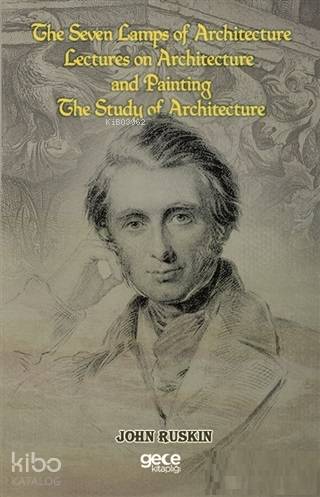9786052883426
480083

https://www.sehadetkitap.com/urun/the-seven-lamps-of-architecture-lectures-on-architecture-and-painting-the-study-architecture
The Seven Lamps of Architecture Lectures on Architecture and Painting The Study Architecture
257.00
"...What is true of human polity seems to me not less so of the distinctively political art of Architecture. I have long felt convinced of the necessity, in order to its progress, of some determined effort to extricate from the confused mass of partial traditions and dogmata with which it has become encumbered during imperfect or restricted practice, those large principles of right which are applicable to every stage and style of it. Uniting the technical and imaginative elements as essentially as humanity does soul and body, it shows the same infirmly balanced liability to the prevalence of the lower part over the higher, to the interference of the constructive, with the purity and simplicity of the reflective, element. This tendency, like every other form of materialism, is increasing with the advance of the age; and the only laws which resist it, based upon partial precedents, and already regarded with disrespect as decrepit, if not with defiance as tyrannical, are evidently inapplicable to the new forms and functions of the art, which the necessities of the day demand. How many these necessities may become, cannot be conjectured; they rise, strange and impatient, out of every modern shadow of change. How far it may be possible to meet them without a sacrifice of the essential characters of architectural art, cannot be determined by specific calculation or observance. There is no law, no principle, based on past practice, which may not be overthrown in a moment, by the arising of a new condition, or the invention of a new material; and the most rational, if not the only, mode of averting the danger of an utter dissolution of all that is systematic and consistent in our practice, or of ancient authority in our judgment, is to cease for a little while, our endeavors to deal with the multiplying host of particular abuses, restraints, or requirements; and endeavor to determine, as the guides of every effort, some constant, general, and irrefragable laws of right—laws, which based upon man's nature, not upon his knowledge, may possess so far the unchangeableness of the one, as that neither the increase nor imperfection of the other may be able to assault or invalidate them..."
"...What is true of human polity seems to me not less so of the distinctively political art of Architecture. I have long felt convinced of the necessity, in order to its progress, of some determined effort to extricate from the confused mass of partial traditions and dogmata with which it has become encumbered during imperfect or restricted practice, those large principles of right which are applicable to every stage and style of it. Uniting the technical and imaginative elements as essentially as humanity does soul and body, it shows the same infirmly balanced liability to the prevalence of the lower part over the higher, to the interference of the constructive, with the purity and simplicity of the reflective, element. This tendency, like every other form of materialism, is increasing with the advance of the age; and the only laws which resist it, based upon partial precedents, and already regarded with disrespect as decrepit, if not with defiance as tyrannical, are evidently inapplicable to the new forms and functions of the art, which the necessities of the day demand. How many these necessities may become, cannot be conjectured; they rise, strange and impatient, out of every modern shadow of change. How far it may be possible to meet them without a sacrifice of the essential characters of architectural art, cannot be determined by specific calculation or observance. There is no law, no principle, based on past practice, which may not be overthrown in a moment, by the arising of a new condition, or the invention of a new material; and the most rational, if not the only, mode of averting the danger of an utter dissolution of all that is systematic and consistent in our practice, or of ancient authority in our judgment, is to cease for a little while, our endeavors to deal with the multiplying host of particular abuses, restraints, or requirements; and endeavor to determine, as the guides of every effort, some constant, general, and irrefragable laws of right—laws, which based upon man's nature, not upon his knowledge, may possess so far the unchangeableness of the one, as that neither the increase nor imperfection of the other may be able to assault or invalidate them..."
Iyzico İle Öde
| Taksit Sayısı | Taksit tutarı | Genel Toplam |
|---|---|---|
| Tek Çekim | 257,00 | 257,00 |
| 2 | 128,50 | 257,00 |
| 3 | 85,67 | 257,00 |
| 4 | 64,25 | 257,00 |
Yorum yaz
Bu kitabı henüz kimse eleştirmemiş.




















